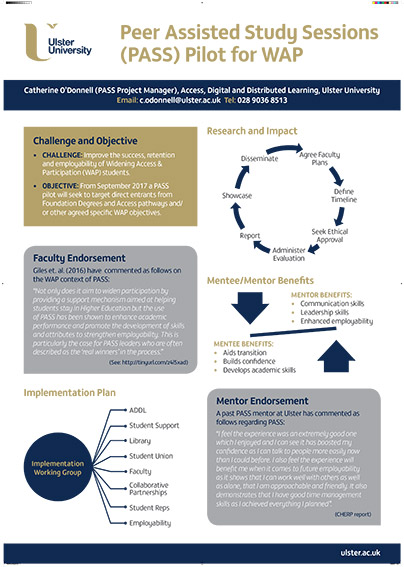Page content
Peer Assisted Study Sessions are an adaptation of a Supplemental Instruction (SI) model, initiated in 1973 at The University of Missouri–Kansas City (UMKC). It is an internationally renowned academic support and retention program which offers peer mentoring with recognised National and International networks.
PASS is a quality assured peer mentoring programme which adheres to the following 21 principles.
- PASS is a methodology for learner support
- PASS is small group learning
- PASS is facilitated by other students acting as mentors
- PASS is confidential
- PASS is voluntary
- PASS is non-remedial
- PASS is participative
- PASS is content-based and process-oriented
- PASS encourages collaborative, rather than competitive learning
- PASS benefits all students regardless of current academic competency
- PASS gives privacy to practise the subject, make mistakes and build up confidence
- PASS gives opportunity to increase academic performance
- PASS is pro-active, not reactive
- PASS targets high `risk´ courses, not high `risk´ students
- PASS decreases drop-out rates and aids retention
- PASS encourages learner autonomy
- PASS does not create dependency
- PASS integrates effective learning strategies within the course content
- PASS enables a clear view of course expectations
- PASS works in the language of the discipline
- PASS challenges the barrier between year groups
From PASS / SI Supervisor Training, Cork, November 2017
Copyright University of Manchester

Benefits
- Personal and Professional Development Opportunity
- Skills Development
- Leadership skills
- Communication skills
- Teamwork experience
- Opportunities to reflect, review and re-evaluate
- Increased academic performance
- Increased relationships with staff
- Sense of being part of the University community
- Reward and recognition
- Learning Gain
- Future Employment

Benefits
- Provides support and guidance
- Sense of belonging and identity
- Settling into course
- Non-threatening
- Non-remedial
- Social benefits
- Increased academic confidence
- Improved communication
- Team working Skills
- Collaborative problem solving skills
- Improved interpersonal skills
- Safe space to admit not understanding

Benefits
- Provides staff with regular and ongoing feedback
- Recognised by QAA and professional bodies
- Improves student study skills
- Fosters a spirit of community
- Improves collaborative problem solving skills
- Improves interpersonal skills
- Safe space to admit not understanding
- Improves the student experience
- Improves academic performance
- Reduces student drop out rates
- Widens access to diverse student body
- Learning Gain
Testimonials
"I feel the experience was an extremely good one which I enjoyed and I can see it has boosted my confidence as I can talk to people more easily now than I could before. I also feel the experience will benefit me when it comes to future employability as it shows that I can work well with others as well as alone, that I am approachable and friendly. It also demonstrates that I have good time management skills as I achieved everything I planned."
Student
"Not only does it aim to widen participation by providing a support mechanism aimed at helping students stay in Higher Education but the use of PASS has been shown to enhance academic performance and promote the development of skills and attributes to strengthen employability. This is particularly the case for PASS leaders who are often described as the ‘real winners’ in the process."
Staff member
Dissemination
C. O'Donnell, (May 2017) PASS Poster Presentation at the Employability: Beyond the metrics Conference at Ulster University.

















